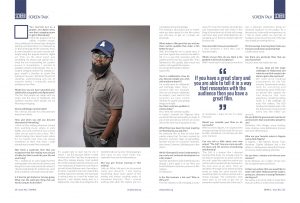Nigeria’s fast-rising filmmaker, James Abinibi, who is famous for his artistic-cum-creative digital works, such as ‘A Great Day,’ ‘Honourable’ and ‘Mentally’ is elite in the digital design industry.
However, film-making was a call that had for long been knocking on his heart. The passion for film and storytelling that had burnt in him culminated in film-making journey that has begun take shape and bear semblance a great in the making.
Like his film-making idol, Oscar nominated director, Quentin Tarantino, Abinibi is not afraid of telling stories however unconventional they are perceived.
You started out as a graphic and digital artist, was that a stepping-stone to get to filmmaking?
I think the graphics bit is a calling I couldn’t escape, since childhood I’ve always had a thing for painting and illustrations so I followed up on that all through till the university level. It came naturally to me and I became self-taught using the popular tools for digital art. Film, on the other hand, was something I’ve always had passion for. I loved the art of storytelling but couldn’t pursue it immediately. I wanted to establish myself professionally first as a Graphic Designer before film making so I gave myself a timeline to study film making on my own, I did about 10 years of studying, understudying and lots of research before I eventually started making my own films.
Would you say you have saturated your satisfaction as a graphic and digital artist?
The fact that people are happy with my works and the kind of feedback and audience reaction when people see my films keeps me going.
Do you still design commercially?
Yes, I still do. But only for a few premium brands and clients.
How and when you did you become interested in film making?
I think my film making adventure started from watching music videos in early 2000s and I took interest in how a music video can be used to tell a story. The I started making story based music videos for my friends back then but always mentioned to them that what I really wanted was to make films eventually.
Was there a particular time that you recognized that film making was not just a hobby but that it would be your life and your living?
Yes, I realized at an early stage that film making takes time and lots of patience and being that I was really passionate about it, I had to really decide if I wanted it as a part time or full time. Of cause I went full time.
Is it hard to get started or to keep going? What was the particular thing that you had to conquer to do either?
It’s usually hard to start but for me it wasn’t. I say this because before I made my first short film, I had lots of experience about film making already. I had studied lots of film making materials, directors and even had practical experience working on set with Kunle Afolayan and a few others. So when I wanted to start out I had all the needed experience already. The hard part is raising funds as a new filmmaker but because I was already doing well as a digital artist, I was able to put together the needed funds on my own. To keep going is also hard, as you need funds too, especially if you are an indie producer.
Did you get formal training in film making?
I did not. What I did was a lot of personal study and research. I was always researching about every aspect of film making and always studying works of renowned directors. Then I started working with other filmmakers just so I could get practical knowledge.
Film making is all practical and no matter what you learn about it in the film school you still have to get on a proper set physically.
What makes a film great for you and are there certain qualities that make a film better for you?
Well, first thing for me is a great story. If you have a great story and you are able to tell it in a way that resonates with the audience then you have a great film. Then followed by film quality, both visual and audio. In all, a good film requires lots of talented hands to deliver a great film.
You’re a collaborator. How do you discover people you work with and know they fit?
I’m usually open to collaborate and exchange ideas. Once I connect with you mentally, then we can always collaborate on project, I just need to first ascertain we have similar mind set for quality and getting things done right.
Are there common qualities in cinema today?
Yes, I think the common quality in today’s cinemas for Nigerian films would be film look and quality of visuals. If you check around you will see we all use almost the same set of equipment now.
What films have been the most inspiring or influential to you and why?
No particular film as they all have their various impact but I’m more inspired by Directors and their styles of storytelling. Number one for me is Quentin Tarantino, then James Cameron, Spielberg and a few others.
Which film maker(s) were fundamental in your early and continual development as a filmmaker?
Quentin Tarantino’s style of directing even though I don’t apply it in my films and Kunle Afolayan’s business prowess of film making.
The Business

Is the film business a fair one? Why or Why not?
The film industry is still emerging in some areas. For now, the cinemas are quite few and monopolized and then there is this thing of favoritism but all that will change with time. Also more VOD platforms are springing up so that too should make the business fair.
How many films have you produced?
I have produced 2 short films and 3 feature lengths.
Which of your films do you think is the greatest in terms of acceptance?
Well, I would say I’m yet to get to that level of acceptance I hope for but it’s closer than ever.
Would you consider your films so far successful?
Well, by cinema figures, I’ve surpassed the average earnings so that count for success but like I said before, I’m not there yet. But soon, real soon.
Can you tell us little about your new project “The Call”, how you came up with the ideas and the process of producing and directing?
‘The Call’ is a feature film I directed starring Woli Arole. He actually came to me that he wanted me to direct a film for him and I asked him what the motive was and he said he wanted to take his brand to the next level as an actor. Then we decided to leverage on his already existing brand by tying the story around him, something that can still be comical with a strong message. The production took some time as we had to get lots of elements needed in place but at the end, it was a pleasant experience being an associate producer on the project. As a director too, it was really an experience, as I had to shoot where we had lots of hooligans active but at the end of the day they ended up working with us.
On the average, how long does it take you from pre-production to premiering?
Usually about a year.
Are there any particular films that are your favorites?
Yes, but I have not made them yet.
To you, what are the major challenges of Nollywood and what do you think needs to be done to get to the next level?
We need more enabling environments for the film industry. Government can also help by revisiting and empowering some of the laws on ground that support the film industry. But from experience, I would say raising funds is a big challenge for most filmmakers. The BOI funding has helped quite a bit but the process is long and not every new filmmaker can access it.
Do you think the government need to set up structures that would allow people to use?
Definitely, Film villages, more funding, more cinemas, more distribution licenses and more effective laws.
Who are your favorite actors in Nigeria and outside Nigeria?
In Nigeria, I like Ramsey Nouah, Toyin Abraham, Gabriel Afolayan and a few others.
In Hollywood, Leanordo Di Capro, Jim Carrey, Andy Samberg, Idris Elba.
Do you have a mentor and who are your mentors?
Kunle Afolayan. As a matter of fact, he’s like my older brother and friend.
Is there any advice that you would like to share with other Nollywood filmmakers, producers, directors or young filmmakers starting out?
My advice is for all to strife to make films that can outlive us in the minds of people.








